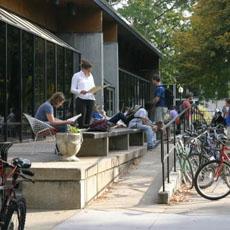當(dāng)前位置: Language Tips> VOA聽(tīng)力> Special Speed News VOA慢速
分享到
This is the VOA Special English Education Report.
Imagine that you have lost your job. You could start a sewing business at home if you had a better sewing machine and a little money to advertise. But you cannot get a loan from a bank.
In recent times, many people in similar situations have received loans from student microfinance groups. Such groups make small loans for business or personal use. Twelve of the organizations are part of a national network called Campus Microfinance Alliance. The Alliance provides financial aid, technical advice and training programs for its member groups.
Each group has between 10 and 70 volunteers, many of them college students. They have enabled hundreds of people across the United States to launch small businesses.
Vanessa Carter is director of the alliance. She says bad economic times have sped the growth of the college microfinance movement.
VANESSA CARTER: "This really got started because students were walking off campus, it was the height of the economic recession, and they were seeing boarded-up businesses and the effects of high unemployment first hand."

In Iowa, a student microfinance group at Grinnell College helps people both locally and internationally. The group started in 2007. At that time, Grinnell student Jeff Raderstrong and some friends raised more than 600 dollars from other students.
The Saturday-night Grinnell tradition of missing a meal to help others enabled the group to make loans through the international microfinance organization, Kiva.org. The Social Entrepreneurs of Grinnell – SEG – was launched.
Later, SEG moved toward making loans directly to international partners. But as time passed, the group started helping people in Iowa. Jeff Raderstrong remembers how that developed.
JEFF RADERSTRONG: "It sort of really quickly became clear that there was a lot that we could do in the community, in the Grinnell community. Because, you know, the town itself, there is some wealth but there is a lot of poverty, and it's is a lot of rural poverty."
Mark Root-Wiley was another early member of SEG. He says the group recognized that small targeted loans at zero-percent or low interest could help local residents. SEG money has helped people make car payments so they can get to their jobs. It also helped patients in need of temporary housing near the medical center where they receive treatment.
And that's the VOA Special English Education Report, written by Jerilyn Watson. For more news about education and for transcripts, MP3s and now PDFs of our programs for e-readers, go to voaspecialenglish.com. I'm Christopher Cruise.
Indian state seeks limits on microfinance after reports of abuses
Business school prize promotes global water strategies
(來(lái)源:VOA 編輯:Rosy)
分享到
關(guān)注和訂閱


口語(yǔ)
關(guān)于我們 | 聯(lián)系方式 | 招聘信息
電話:8610-84883645
傳真:8610-84883500
Email: languagetips@chinadaily.com.cn